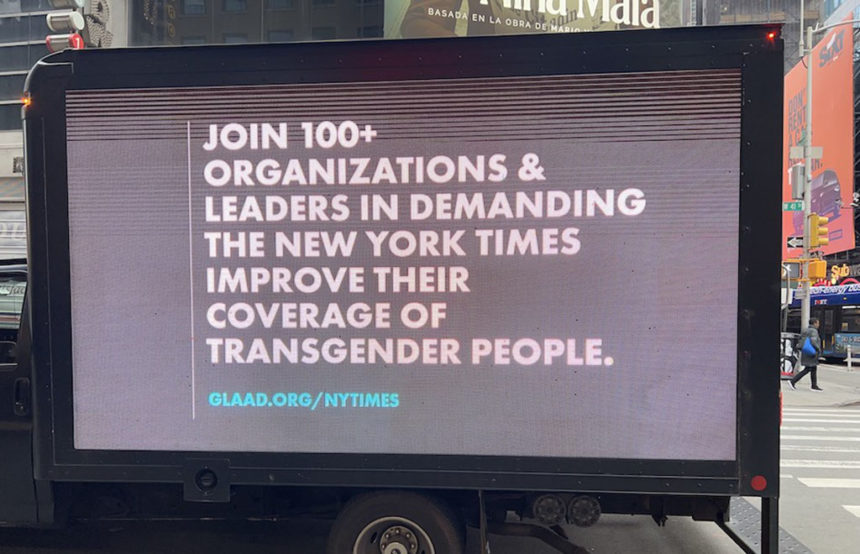The New York Times published a collection of letters to the editor on Friday after it was criticized separately by its own contributors and activists over its coverage of transgender, nonbinary and gender-nonconforming people.
Entitled “J.K. Rowling and Trans Women: A Furor,” the showcase of six letters to the editors from readers nationwide take a variety of stances on the opinion column published 24 hours earlier, “In Defense of J.K. Rowling.”
The piece from weekly opinion columnist Pamela Paul discussed the Harry Potter author’s outspoken advocacy for the right to spaces for biological women. Rowling’s tweets and support for like-minded leaders have sparked anger from the LGBTQ population and verbal abuse and threats of violence towards the author for questioning phrases such as “people who menstruate.”
The timing of the publication and lack of response from the Times to their letters was called out by activists and supporters on social media.
“It’s shocking that one of the world’s biggest media companies is failing at communicating both inside and outside their walls, and it’s getting worse by the minute,” said GLAAD CEO and president Sarah Kate Ellis. “Rather than listen to transgender people and advocates, or hear out their own colleagues who independently raised similar concerns about biased and harmful coverage, The New York Times defended its problematic stories, published more inflammatory commentary, then threatened and attempted to silence employees who dare to speak up.”
No Times editor or representative reached out to GLAAD in response to the advocates’ letter or to address the concerns in it, according to Ellis. The Times’ contributors said they have also not received a direct response.
The letters, signed by hundreds of organizations, leaders and current and former NYT contributors, called out the publication for allocating resources and pages to alleged extremist anti-LGBTQ activists, citing coverage deemed biased and harmful.
GLAAD and Times contributors delivered separate letters to the Times on Wednesday while a billboard truck with messages from the coalition letter circled the newspaper’s office building in Manhattan.
GLAAD and the coalition of more than 100 organizations and community leaders called for the Times to stop printing biased anti-trans stories immediately, meet with trans community leaders within two months and hire at least four trans journalists within three months. Notable signees include Gabrielle Union-Wade, Judd Apatow, Lena Dunham, Tommy Dorfman, Jameela Jamil and Jonathan Van Ness.
This week, Times director of external communications Charlie Stadtlander in a statement recognized the letters, but seemingly lumped together the demands from GLAAD and other leaders and those from present and former NYT contributors, causing further outrage.
“We received the letters and welcome this feedback. We understand how GLAAD and the co-signers of the letter see our coverage. But at the same time, we recognize that GLAAD’s advocacy mission and The Times’s journalistic mission are different,” Stadtlander said in a statement. “As a news organization, we pursue independent reporting on transgender issues that include profiling groundbreakers in the movement, challenges and prejudice faced by the community, and how society is grappling with debates about care.”
Stadtlander said that Paul’s column was in progress for more than a week before the letters’ delivery on Wednesday. Paul’s column publishes every Wednesday at 5 a.m. EST and the most recent publication was “in no way in response or tied to yesterday’s letters,” he said.
Internally, Times leadership addressed a memo to staff Thursday, calling out members who participated in the campaign as violating the company’s ethics policy. NYT executive editor Joe Khan said the policy prohibits journalists from aligning themselves with advocacy groups and joining protest actions on matters of public policy.
“We do not welcome, and will not tolerate, participation by Times journalists in protests organized by advocacy groups or attacks on colleagues on social media and other public forums,” the memo read.
In response, NYT contributors updated the website where their letter can be found with a new statement addressing disappointment that the newspaper chose a public response to dismiss their claims. They also clarified that although the timing of the delivery was coordinated with GLAAD, the letters are very different documents.
“We are not an advocacy organization. Our letter is addressed directly to the standards editor, and makes a clear case drawing on the Times’ own history and editorial standards,” the contributors said. “Out of hand, the Times’ comments dismiss the concerns put to them by, at last count, over 1,000 contributors to the New York Times, among them eminent writers, artists, photographers and holders of elected office, and the countersignatures of 23,000 media workers, readers and subscribers to the newspaper.”
“We await a courteous reply.”
This story originally appeared on PRWeek US.







